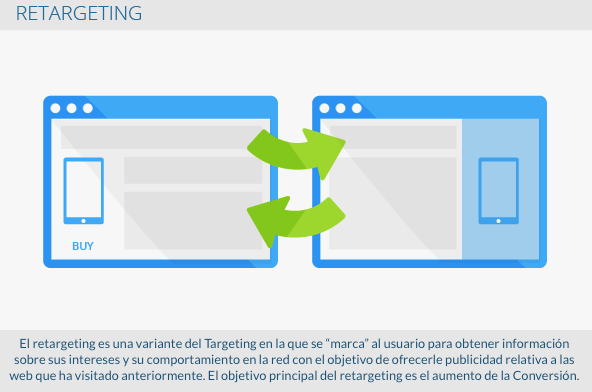The retargeting It is a variant of Targeting in which the user is "branded" to obtain information about their interests and their behavior on the Internet with the aim of offering commercial promotion related to the websites they have previously visited. The main objective of retargeting is to increase Conversion.
Functioning
The retargeting is normally carried out by means of the cookies. To achieve this, a Pixel is installed in the source code of the destination page. It is a simple line of code that integrates a cookie on the user's PC, if the page has loaded successfully. This cookie provides information about the products visited and the pages visited, and sends this information to an Adserver that coordinates the advertisements that it will show to the user. If the customer visits another web portal that has the same commercial promotion program, the Adserver will provide him with offers related to his previous conduct.
Normally the retargeting used in e-commerce with the conversion goal.

Examples
- A customer adds a product to the shopping cart but does not complete the purchase. The pixel is activated and the customer receives offers for that product on other websites.
- A user has visited a particular category of an online store. The customer will receive product announcements related to this category.
- A user has canceled a file download. The user will receive commercial promotion of similar downloads through, for example, banners.
Benefits
Through the retargeting online stores can increase the pressure of your advertising campaigns and incentivize potential customers to purchase. The advantage of this method is that you have control of the advertising campaigns and its costs are much lower than in conventional commercial promotion.
Retargeting through AdWords and Facebook
Google AdWords customers can create their own advertising campaigns of retargeting. You will only need a Google Analytics account and make a small adjustment to the tracking code to retrieve data from Google AdWords advertising campaigns through Google Analytics.
Currently the retargeting of Google is based on the use of cookies. However, Google is investigating to come up with new tracking solutions. For example, former visitors to a web portal can be redirected thanks to the help of the RLSA (Retargeting List for Search Ads).
The retargeting It is also part of the commercial promotion on Facebook. The possibilities of adapting advertising campaigns are very numerous due to the large database that Facebook has thanks to the profiles of its users. Only large companies can make use of this information through Facebook Exchange In spite of everything, Facebook seeks in the future to offer this service also to small companies.
critics
The retargeting It is criticized mainly for the large amount of data that is collected through the profiles of users and their previous behaviors for the creation of advertising campaigns that are the most effective feasible. These data can be linked to much more complete databases such as Big data and with just a few clicks you can access all the information. However, the user is usually not aware of this use or of the companies that have said information.
Sometimes Internet users find ads that they find "dubious" since they do not understand how it is feasible for them to receive banners of the product or the web portal they have previously visited. From the point of view of data protection, the practices of the retargeting they are dangerous due to data theft or the opportunity for hackers and criminals to use such information. At the same time, most of the time users cannot even choose whether to use them or not. Therefore, if users prefer, they can block cookies from the browser.
Web links
- The retageting of online commercial promotion worries consumers Blog puromarketing.com
- The 7 Deadly Sins of Retargeting Blog merca20.com






